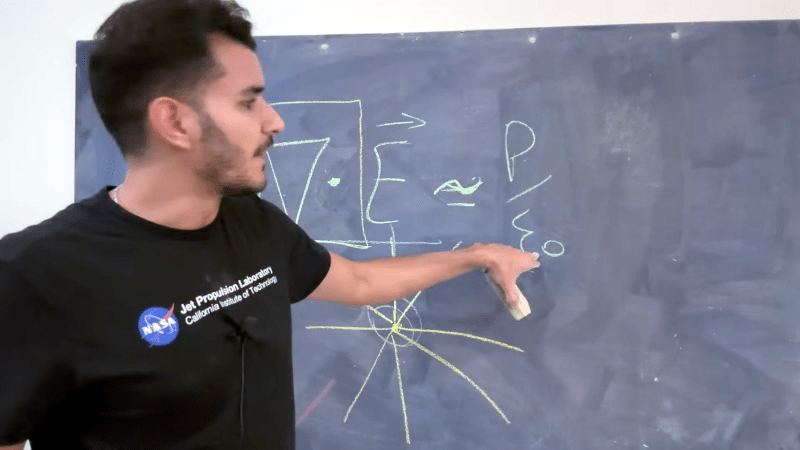You don’t have to know how a car engine works to drive a car — but you can bet all the drivers in the Indy 500 have a better than average understanding of what’s going on under the hood. All of our understanding of electronics hinges on Maxwell’s equations, but not many people know them. Even fewer have an intuitive feel for the equations, and [Ali] wants to help you with that. Of course, Maxwell’s gets into some hairy math, but [Ali] covers each law in a very pragmatic way, as you can see in the video below.
While the video explains the math simply, you’ll get more out of it if you understand vectors and derivatives. But even if you don’t, the explanations provide a lot of practical understanding
Understanding the divergence and curl operators is one key to Maxwell’s equations. While this video does give a quick explanation, [3Blue1Brown] has a very detailed video on just that topic. It also touches on Maxwell’s equations if you want some reinforcement and pretty graphics.
Maxwell’s equations can be very artistic. This is one of those topics where math, science, art, and history all blend together.
















“f(x)=x” wat.
“it’s plus, so like an OR-gate” df?
I think, with the function, he was justing throwing that up as a generic function (not meant to be taken as a literal formula) to establish which side he was considering as input (the right), and the consequential output (the left)
The second one touches on an interesting relationship between mathematical operators (+, ×) and logical operators (or, and), respectively. If we limit ourselves to zero and positive, nonzero numbers (like one), you can appreciate that 1 + 0 = 1, in the same way that true OR false = true, whereas true AND false = false, just like 1 × 0 = 0.
The way he brought it up, though, makes me think he was suggesting he wanted to use the equation to investigate or understand the behavior of each of those twe pieces while ignoring the what was on the other side being added to it.
I hope that helps.
(Corrections or improvements welcome!)
He uses f(x)=x to explain (insufficiently) what a mathematical function is. f(x)=x is a special case of the general linear function (f(x)=ax+b). If you plot f(x)=x you get a line with a slope of 1 through the origin.
Another good video on Maxwell equations: https://www.youtube.com/watch?v=F3QHUvr8d8I
Maxwell equations are the work of Faraday expressed in written formulae.
@Jeepika said: “Maxwell equations are the work of Faraday expressed in written formulae.”
In-essence true, but: Maxwell’s equations, or Maxwell–Heaviside equations, in one form are a set of coupled partial differential equations that, together with the Lorentz force law, form the foundation of classical electromagnetism…[1] There is also an Integral formulation of Maxwell’s Equations.[2]
References:
[1] Maxwell’s Equations – Differential formulations
https://en.wikipedia.org/wiki/Maxwell's_equations
[2] Maxwell’s Equations – Relationship between differential and integral formulations
https://en.wikipedia.org/wiki/Maxwell's_equations#Relationship_between_differential_and_integral_formulations
Next step for intuitive approaches: Let’s talk about Quaternions.
Use Rotors.
https://youtu.be/Idlv83CxP-8
One of the intuitions I get from {del} {dot} B = 0, aside from no magnetic monopoles, is that all field lines are closed and loop back, hence no divergent behavior. You mentioned you couldn’t create a B field without an E field, but that is not true for magnetic materials that have a constant B field established due to their particle alignments. Otherwise, great video! Thanks.
There is a reasonable (if somewhat lacking) effort to answer your question here:
https://physics.stackexchange.com/questions/413741
It seems like nitpicking to say “differentials, not derivatives” so I shan’t. Keep on the heavy side.
A bit rushed but I think I got the gist.
Al Williams said: “All of our understanding of electronics hinges on Maxwell’s equations…”
Being true to the Pedant that I am: Maxwell’s equations are the basis for the study of Electromagnetics (or Electromagnetism). There is a LOT more to the corpus of Electronics in general.